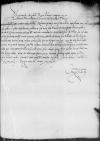Reverendo in Christo Patri, domino ⌊Ioanni episcopo Culmensi⌋, sincere nobis dilecto
⌊Sigismundus⌋ Dei gratia rex ⌊Poloniae⌋, magnus dux ⌊Lithuaniae⌋, ⌊Russiae⌋, ⌊Prussiae⌋, ⌊Masoviae⌋ etc. dominus et heres.
[R]everende in Christo Pater, sincere nobis dilecte.
Relatum est nobis non solum adhuc non solutas esse, sed ne solui quidem inceptas contributiones publicas in istis ⌊terris nostris Prussiae⌋ pro necessitate illarum publica, communi voto et assensu omnium ordinum et statuum earundem terrarum novissime decretas, quae ad diem festum purificationis sanctae Mariae proxime praeteritum extradi ad manus exactorum ad hoc designatorum debuerant, iuxta litteras nostras universales per nos desuper emissas, quae res displicet nobis vehementer, et proinde hortamur Paternitatem Vestram, omnino habere volentes, ut eam ipsam contributionem subditis suis, citra moram et dilacionem ulteriorem solvi iubeat, ipsaque illam iuxta litteras nostras universales desuper editas solvat. Et aliter non faciat pro rei decentia gratiaque nostra Vestra Paternitas.
Quae bene valeat.
Datae ⌊Cracoviae⌋, die sancti Mathiae Apostoli, anno Domini millesimo D-o XXXIII-o, regni vero nostri anno XXVII-o.
Commissio propria regiae maiestatis.

